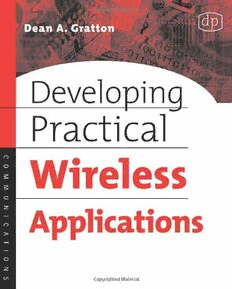
Developing Practical Wireless Applications PDF
Preview Developing Practical Wireless Applications
Developing Practical Wireless Applications This page intentionally left blank Developing Practical Wireless Applications Dean A. Gratton Amsterdam • Boston • Heidelberg • London • New York • Oxford Paris • San Diego • San Francisco • Singapore • Sydney • Tokyo Digital press is an imprint of Elsevier 30 Corporate Drive, Suite 400, Burlington, MA 01803, USA Linacre House, Jordan Hill, Oxford OX2 8DP, UK Copyright © 2007, Elsevier Inc. All rights reserved. All illustrations created by Dean A. Gratton. No part of this publication may be reproduced, stored in a retrieval system, or transmitted in any form or by any means, electronic, mechanical, photocopying, recording, or otherwise, without the prior writ- ten permission of the publisher. Permissions may be sought directly from Elsevier’s Science & Technology Rights Department in Oxford, UK: phone: (+44) 1865 843830, fax: (+44) 1865 853333, E-mail: [email protected]. You may also complete your request on-line via the Elsevier homepage (http://elsevier.com), by selecting “Support & Contact” then “Copyright and Permission” and then “Obtaining Permissions.” Recognizing the importance of preserving what has been written, Elsevier prints its books on acid-free paper whenever possible. Library of Congress Cataloging-in-Publication Data Gratton, Dean A. Developing practical wireless applications / Dean A. Gratton. – 1st ed. p. cm. Includes bibliographical references and index. ISBN-13: 978-1-55558-310-1 (pbk. : alk. paper) ISBN-10: 1-55558-310-5 (pbk. : alk. paper) 1. Wireless communication systems. 2. Product management. I. Title. TK5102.G75 2006 621.384–dc22 2006023176 British Library Cataloguing-in-Publication Data A catalogue record for this book is available from the British Library. ISBN 13: 978-1-55558-310-1 ISBN 10: 1-55558-310-5 For information on all Digital Press publications visit our Web site at www.books.elsevier.com Printed in the United States of America 06 07 08 09 10 9 8 7 6 5 4 3 2 1 It takes just one person to believe in you to make a difference; for me that’s Sarah, my wife. With her continued belief in me I can truly fly. To Henry John Camden: the ideas we could have shared! v “The future success of wireless technology rests upon it becoming as overlooked as electricity.” Gratton, D. A., 2006 Contents About the Author xii Preface xiii Acknowledgements xv Introduction xvi Part One Understanding a Wireless World 1 1 Making Sense of Wireless Technology 3 Where are We Today with New Wireless Technology? 4 Reasons for Choosing Wireless 5 Where is the Original Thought? 6 A New Way of Thinking 7 Summary 8 2 Understanding the Wireless Audience 10 Categorizing the Wireless Audience 13 The Diffusion of Wireless Innovation 13 Cultural Economic Effects on Product Pricing 15 A Long-term Perspective 16 Summary 16 3 Comparing Wide-area and Personal-area Communications 19 Wide-area vs. Personal-area 19 Generations of Wireless Technology 23 First Generation (1G) 23 Second Generation (2G), 2.5G and 2.75G 27 Third Generation (3G) 33 The next generation of cellular applications 37 Wireless Convergence 37 Broadband wireless 39 Manufacturers’ Refocus of Consumer Perception and Usage Models 40 Summary 41 vii viii Contents 4 Can we Confidently Rely on Wireless Communication? 43 How Safe is Your House? 44 Access control 46 WarXing: War-Walking, War-Driving and War-Storming 47 BlueJacking/BlueSnarfing 49 Encryption Principles 50 Wired Equivalent Privacy (WEP) 50 WiFi Protected Access 52 Bluetooth authentication, pairing and encryption 58 Security features in other wireless technologies 65 It’s All About Adopting a Common Sense Approach to Wireless Security 66 Enabling Intelligent Connectivity 66 Coexistence and Interoperation 68 Ignoring unwanted noise 70 How can we talk with each other? 71 Summary 75 5 Realizing a True Wireless Life-style Vision 78 Defining Quantitative Needs for Technology 78 In Technology we Trust 80 Working with technology 83 Living with technology 85 Summary 89 Part Two A Proprietary Approach to Developing Wireless Applications 91 6 An Introduction to the Notion of Proprietary-based Wireless Application Development 93 Case Studies 94 7 ZenSys: An Open Standard for Wireless Home Control 95 Background 97 Enabling Wireless Home Control 97 Enabling the Wireless Home Control Network 98 The RF transceiver 98 The mesh networking topology 100 Self-organization, self-healing and ease-of-use 102 A different kind of class 103 Conclusion 104 Summary 106 Contents ix 8 Cypress Semiconductor:Introducing WirelessUSB 110 Background 112 The WirelessUSB Challenge 112 The RF composition 113 Crossing the bridge 115 WirelessUSB for sensor networks 115 Conclusion 118 Summary 118 9 Aura Communications Technology:Creating the Personal Bubble 121 Background 122 Near Field Magnetic Communication 123 Making bubbles 123 Propagation 126 Coexistence and interference 128 Quality of service 129 Conclusion 130 Summary 130 Part Three A Standards Approach to Developing Wireless Applications 133 10 An Introduction to the Notion of Standards-based Wireless Application Development 135 Case Studies 136 11 Bluetooth:A Cable Replacement Technology 137 Bluetooth vs. Infrared 138 The Odd Couple: Bluetooth and Ultra-Wideband 139 Bluetooth over UWB 140 WiMedia Me 141 The Original Bluetooth 142 The Radio Architecture 142 The frequency hopping scheme 143 Adaptive frequency hopping 144 Basic rate and enhanced data rate 145 Power classes 146 Bluetooth clock 146 Bluetooth device addressing 148 The Bluetooth Protocol Stack 148 Link Controller (LC) 149
